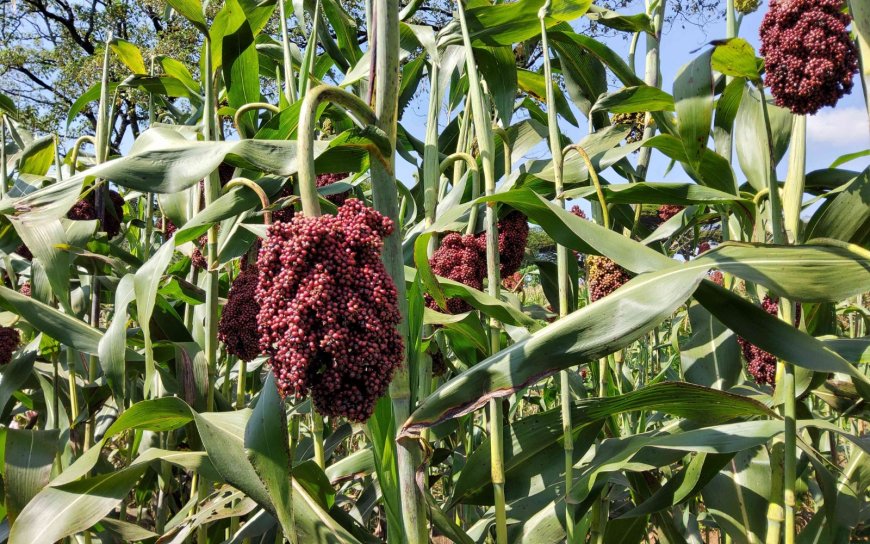Climate-Adaptive Crop Varieties is the Key Strategy for Resilient Agriculture.
The success stories of climate-adaptive crops extend beyond mere survival; they offer the promise of increased yields and improved livelihoods for farmers.

By Albert Ouma, Migori County
In the midst of escalating climate challenges, the adoption of climate-adaptive crop varieties emerges as a critical tactic in fortifying global food systems against environmental shocks.
Experts from renowned institutions such as the Intergovernmental Panel on Climate Change (IPCC) emphasise the urgency of this approach, highlighting its potential to bolster agricultural resilience amidst a changing climate.
According to data from the Food and Agriculture Organization of the United Nations (FAO), climate change is projected to decrease global crop yields by up to 25% by 2050, with vulnerable regions facing even steeper declines.
Dr. Maria Rodriguez, a leading agronomist at the World Bank, underscores the significance of climate-adaptive crops in mitigating these impacts, stating, "By developing crop varieties tailored to withstand climatic extremes, we can safeguard food security and livelihoods for millions of farmers worldwide.".
Traditional crop varieties often struggle to cope with the extremes of a changing climate. Erratic weather patterns, increased temperatures, and unpredictable precipitation levels pose substantial threats to global food production.
In response, scientists and agricultural experts are championing the development and implementation of climate-adaptive crop varieties as a potent tool in the arsenal against these challenges.
The essence of climate-adaptive crops lies in their ability to withstand, or even thrive in, adverse environmental conditions. This resilience is achieved through meticulous breeding and genetic modification techniques that enhance the plant's ability to endure stressors such as drought, heat, pests, and diseases.
As we delve into the intricate world of climate-adaptive crops, it becomes evident that this strategy not only ensures food security but also contributes to sustainable and eco-friendly farming practices.
One remarkable aspect of climate-adaptive crops is their potential to reduce reliance on chemical inputs. By bolstering natural resistance mechanisms, these crops exhibit enhanced pest and disease resistance, reducing the need for pesticides.
This shift towards more ecologically balanced farming practices aligns with the broader goal of creating agricultural systems that are both environmentally sustainable and economically viable.
Take, for instance, the development of heat-tolerant varieties of staple crops like wheat, rice, and maize. As temperatures soar due to climate change, conventional varieties face significant yield losses.
However, scientists have successfully bred varieties that can thrive in higher temperatures, offering a beacon of hope for regions grappling with heat-induced agricultural challenges.
These climate-adaptive crops not only ensure food production in the face of adversity but also contribute to the mitigation of climate change by maintaining carbon-sequestering vegetative cover on the land.
Furthermore, the adoption of climate-adaptive crops contributes to the preservation of biodiversity. As monoculture practices give way to diverse crop varieties, the resilience of agricultural ecosystems is enhanced. This shift mirrors natural ecosystems, where biodiversity acts as a buffer against environmental shocks.
The cultivation of diverse, climate-adaptive crops not only safeguards against the loss of entire harvests but also fosters a more sustainable and harmonious coexistence between agriculture and the environment.
The success stories of climate-adaptive crops extend beyond mere survival; they offer the promise of increased yields and improved livelihoods for farmers.
In regions prone to water scarcity, drought-resistant crops not only ensure a stable food supply but also reduce pressure on water resources. This not only benefits farmers but also alleviates stress on ecosystems, promoting a more balanced and sustainable use of natural resources.
While the development of climate-adaptive crop varieties holds immense promise, it is not without challenges. Striking the right balance between genetic modification, ethical considerations, and public acceptance is a delicate task. Transparency in the development process, rigorous testing for safety, and clear communication are essential to gaining public trust and acceptance.
The adoption of climate-adaptive crop varieties represents a pivotal step towards creating a more resilient and sustainable agricultural future. By harnessing the power of science and technology, farmers can navigate the uncertainties of a changing climate while simultaneously reducing their environmental footprint.
The success of climate-adaptive crops hinges on collaborative efforts between scientists, farmers, policymakers, and the public, ensuring that these innovations contribute to a more sustainable and climate-resilient food system.
As we stand at the crossroads of agricultural innovation, the cultivation of climate-adaptive crops offers a beacon of hope for a future where food security and environmental stewardship go hand in hand







